|
|
|
Sort Order |
|
|
|
Items / Page
|
|
|
|
|
|
|
| Srl | Item |
| 1 |
ID:
114376
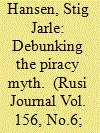

|
|
|
| 2 |
ID:
148805
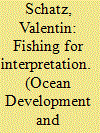

|
|
|
|
|
| Summary/Abstract |
On 2 April 2015, the International Tribunal for the Law of the Sea (ITLOS) rendered its first full-bench Advisory Opinion. In its reply to the request of the West African Sub-Regional Fisheries Commission the ITLOS found that Arts. 62(4), 58(3), 192 of the United Nations Convention on the Law of the Sea contain obligations for a flag state to ensure that vessels flying its flag do not engage in illegal fishing in the exclusive economic zones of coastal states. The Advisory Opinion has widely been praised for bringing clarity to the inadequate international fisheries law regime. This article undertakes to analyze the ITLOS's interpretive approach, expose interpretive deficiencies, and offer possible explanations for some of the outcomes where the ITLOS itself did not do so.
|
|
|
|
|
|
|
|
|
|
|
|
|
|
|
|
| 3 |
ID:
170265
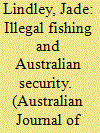

|
|
|
|
|
| Summary/Abstract |
The security impact of illegal fishing is not well understood. Where illegal fishing is recognised as a security problem, the focus has been on fish as a natural resource, the depletion of which can have impacts on food security, individual livelihoods, and the economic survival of states relying on illegal fishing. We argue that a focus on fish as a natural resource obscures the other security challenges the crime of illegal fishing poses to Australia. As this paper explains, illegal fishing overlaps with drug, human, weapon and other contraband trafficking and smuggling; irregular maritime arrivals; and maritime piracy. In addition, like other easily transported, high value resources, illegal fish can fund insurgencies and other types of political violence. Understanding illegal fishing as a security challenge will improve Australia’s national security policy. First, it acknowledges fish as a vital natural resource, implicated in economic, ecological, and human security; second, it analyses how illegal fishing interlinks with other maritime crimes; third, it challenges the effectiveness of monitoring and enforcement of illegal fishing; fourth, it presents an opportunity for effective regional cooperation; and finally it highlights the benefits of regional cooperation in responding to illegal fishing.
|
|
|
|
|
|
|
|
|
|
|
|
|
|
|
|
| 4 |
ID:
181740
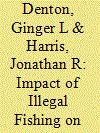

|
|
|
|
|
| Summary/Abstract |
The recent increase in maritime piracy is often associated with economic issues such as a decline in the fishing industry, but there is still no consensus on whether a decrease in local fishing causes a rise in piracy rates. We introduce the use of unreported fish catch and fishing industry type in addition to reported fish catch in Gulf of Guinea waters when analyzing factors influencing West African piracy. Using a newly released data set, which includes Illegal, Unregulated, and Unreported (IUU) fish catch by sector, we show that an increase in reported and unreported fishing yields an increase in piracy. Further, we find that increases in industrial fish catch are related to increases in maritime piracy while the opposite is true of artisanal and subsistence fish catch. We expect this new approach will highlight the impact of IUU and large-scale industrial fishing on piracy throughout the entire world.
|
|
|
|
|
|
|
|
|
|
|
|
|
|
|
|
| 5 |
ID:
130878
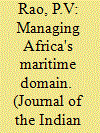

|
|
|
|
|
| Publication |
2014.
|
| Summary/Abstract |
Africa's coastal zones and ocean spaces bear certain unique features as different from those of the other zones of the Indian Ocean region. One such maritime characteristic is that the continent is virtually flanked by sea on all four sides. Such uniqueness of the region has both positive and negative consequences for the coastal countries of Africa. The adverse consequences of the maritime topography, such as piracy and illegal fishing, are rather more seriously felt by today by the regional states. The unstable and fragile political regimes of many of the African littoral countries compound the problems of managing their maritime domains. Maritime criminal and illegal operations are confined not only to the coastal states but also to the island states of the continent. The inability of these states to combat the threats regularly posed by maritime non-state actors has resulted in the enormous naval militarisation of the African waters by foreign naval forces, Western and non-Western. How far and how long the states of the region should depend on foreign countries for ensuring the safety of their coastal zones will also determine the level of independence that these states will retain to keep their maritime wealth and domain under their sovereign control.
|
|
|
|
|
|
|
|
|
|
|
|
|
|
|
|
| 6 |
ID:
121878
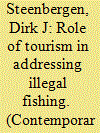

|
|
|
|
|
| Publication |
2013.
|
| Summary/Abstract |
Tackling illegal fishing through traditional state-centred approaches has proven difficult and largely ineffective in the extensive maritime environment of Southeast Asia, and particularly in the archipelagic state of Indonesia. This article focuses on the involvement of a new for-profit actor - a private tourism dive operator - in addressing illegal fishing in a small island archipelago in eastern Indonesia. The case study demonstrates that the dive operator has been able to employ conventional enforcement methods such as patrolling and the capture of illegal fishers, in combination with alternative approaches to addressing the root causes of illegal fishing. It also explores the relationship of the dive operator with civil society actors, non-governmental organizations (NGOs) and various state agencies involved in maritime security and conservation governance in the area. With a particular focus on the dive operator's relationship with government agencies, the case study shows that local governments are collaborating with private actors and providing opportunities for new kinds of enforcement agents since they themselves lack sufficient resources to patrol waters effectively. The dive operator, however, operates only within a space granted by the district government, and must invest considerably in this relationship to maintain his position.
|
|
|
|
|
|
|
|
|
|
|
|
|
|
|
|
| 7 |
ID:
121881
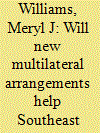

|
|
|
|
|
| Publication |
2013.
|
| Summary/Abstract |
Illegal cross-border fishing is an important maritime security issue in Southeast Asia. Southeast Asian states, along with other states with interests in the region, have created three new multilateral fisheries-relevant arrangements of agencies with overlapping but different memberships: the Regional Program of Action on Illegal, Unreported and Unregulated (IUU) Fishing; the ASEAN-Southeast Asia Fisheries Development Center Strategic Partnership; and the Coral Triangle Initiative. Each of these multilateral arrangements has the potential to help Southeast Asian states deal with fisheries-based security issues more effectively by building polycentric coalitions and capacity. So far, however, they have had a limited impact. This is partly because they are still principally technical support bodies rather than management organizations. In addition, states need to make greater strides towards settling outstanding border disputes and address fisheries overcapacity and overfishing in waters under their jurisdiction. States are unable to address these problems adequately because the fishery sector is typically low in national priority. Moreover, national interest in fisheries remains concentrated on immediate food and economic needs, and, in international relations, on jurisdictional rights.
|
|
|
|
|
|
|
|
|
|
|
|
|
|
|
|
|
|
|
|
|